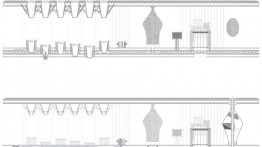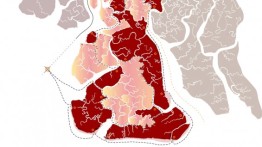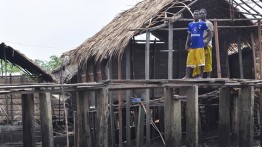Eze Imade Eribo (AR '13) Wins Global Architectural Graduate Award
POSTED ON: October 17, 2013
The Architectural Review has named Floating Radio Station and Fish Smoking Facility, the thesis project by Eze Imade Eribo (AR '13), as a Runner Up in its second annual Global Architecture Graduate Awards. Ms. Eribo made the shortlist of five lauded undergraduate projects from around the world, including Belgium, Chile and the UK. It is the only winning project from the United States. "The awards seek to identify projects with a critical position that advance the role of architecture in an increasingly fractured yet globalized world," according to the GAGA website.
"I was definitely overwhelmed," Ms. Eribo writes via email from Milan, Italy where she is studying for a Masters degree at Domus Academy. "Besides being a personal victory, I am ecstatic that I get to fly the Cooper Union flag!" Ms. Eribo, who appeared in our 2013 snapshot of graduating students, was born and raised in Nigeria’s capital city Abuja. As a teenager she authored a book of poems and plays before graduating high school at age 16. After applying to medical schools she changed her mind and came to The Irwin S. Chanin School of Architecture.

As her thesis site Ms. Eribo chose the Bakassi peninsula, a disputed territory between Nigeria and Cameroon. A wet lowland comprised of mangrove-covered islands and stilt houses, the economy of Bakassi peninsula relies chiefly on exporting fish caught by raft and then smoked. Originally under Nigerian control, Cameroon claimed sovereignty over the area, winning a 2002 judgment by the International Court of Justice. Transfer of power was just concluded on August 15 of this year, a process started in 2006. Ms. Eribo, who had never been there before, travelled to the site thanks to a grant from the William Cooper Mack Fellowship in 2012. While there Ms. Eribo heard local Nigerian's tales of persecution at the hands of the Cameroonian government.
Ms. Eribo's thesis proposes to build a fishing raft using local materials that acts like a floating smokehouse but also secretly houses a recording studio and radio station. It would collect stories of displacement and persecution, then rebroadcast them in the form of folk tales, which would be a more politically palatable form of witnessing. "This project addresses huge existential subjects − alienation, oppression, loss of identity − and offers a response which is not only practical, but utterly compelling in its simplicity," Isabel Allen, a 2013 GAGA judge, says about Ms. Eribo's project. "This is an exemplary essay on clarity of thought and economy of means. And it’s hugely refreshing to see mapping used in a very literal sense, for communication as opposed to obfuscation."
"Eze Eribo has a creative soul with deep roots that connect her psychic life to all her work, written, drawn, or modeled in exceptional ways.," Prof. David Turnbull, who with Professors Hayley Eber and Urtzi Grau comprised the School of Architecture's Thesis faculty, says. "I think that a rich responsiveness to life as it is lived is abundantly evident in her thesis project and that is, precisely, the reason the judges awarded her a prize."
During her studies Ms. Eribo finds time to work on making the floating radio station into a reality. "It was always my goal to implement my project because I honestly believe design should serve humanity," Ms. Eribo writes. "There will be a lot of hurdles. Although it is a design project it is also a political statement, and will naturally attract resistance. But for now I'm constantly improving on the design and the technology (not just radio, but perhaps ad-hoc systems as well), educating myself and reaching out to key people. I can't absolutely promise completion by 2014 but I think it's a good time frame to keep me on my toes!"








